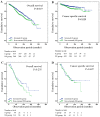Real-world data in elderly men from Yokosuka City 15 years after introducing prostate-specific antigen-based population screening
- PMID: 35003736
- PMCID: PMC8739438
- DOI: 10.3892/mco.2021.2471
Real-world data in elderly men from Yokosuka City 15 years after introducing prostate-specific antigen-based population screening
Abstract
Mass screening based on prostate-specific antigen (PSA) reduces mortality in prostate cancer. However, the effectiveness of this screening in the elderly has not been demonstrated. In the city of Yokosuka, Japan, PSA screening has been conducted since 2001 and the present study examined the real-world status of PSA-based population screening in the elderly. It retrospectively evaluated 1,117 prostate cancer patients >75 years of age. The patients were divided into two groups: The screened group comprising patients diagnosed by PSA-based population screening or workplace screening and PSA follow-up patients at urology clinics; and the non-screened group comprising patients detected by other methods. Overall survival (OS), cancer-specific survival (CSS) and factors contributing to shorter CSS between the groups were compared. In patients >75 years of age, the screened group had significantly longer OS (171 vs. 154 months; P=0.019) and CSS (median not reached; P=0.020) but screening was not an independent factor associated with prolonged OS or CSS on multivariate analysis. The factors contributing to shorten CSS in the elderly were ≥T3 (odds ratio: 3.301 [1.704-6.369], P<0.001), M1 (odds ratio: 4.856 [2.809-8.393], P<0.001) and Gleason score ≥8 (odds ratio: 4.691 [2.479-8.876], P<0.001). In those with metastasis, PSA screening was not associated with prolonged OS or CSS. Real-world data 15 years after introducing PSA-based population screening was not an independent factor for both OS and CSS in multivariate analyses for patients >75 years of age.
Keywords: early diagnosis; mass screening; mortality; prostate cancer; prostatic neoplasm.
Copyright: © Nirei et al.
Conflict of interest statement
The authors declare that they have no competing interests.
Figures

Similar articles
-
Does screening for prostate cancer improve cancer-specific mortality in Asian men? Real-world data in Yokosuka City 15 years after introducing PSA-based population screening.Prostate. 2020 Aug;80(11):824-830. doi: 10.1002/pros.23997. Epub 2020 May 20. Prostate. 2020. PMID: 32433780
-
[Five-year results of prostate specific antigen (PSA) screening in Yokosuka City--comparative study between PSA-screened group and non-screened group].Hinyokika Kiyo. 2008 Mar;54(3):197-201. Hinyokika Kiyo. 2008. PMID: 18411775 Japanese.
-
Clinical outcomes of prostate cancer patients in Yokosuka City, Japan: A comparative study between cases detected by prostate-specific antigen-based screening in Yokosuka and those detected by other means.Int J Urol. 2015 Aug;22(8):747-52. doi: 10.1111/iju.12806. Epub 2015 May 23. Int J Urol. 2015. PMID: 26011393
-
High-risk prostate cancer with Gleason score 8-10 and PSA level ≤15 ng/mL treated with permanent interstitial brachytherapy.Int J Radiat Oncol Biol Phys. 2011 Nov 15;81(4):992-6. doi: 10.1016/j.ijrobp.2010.07.006. Epub 2010 Oct 6. Int J Radiat Oncol Biol Phys. 2011. PMID: 20932674
-
Persistent Prostate-Specific Antigen After Radical Prostatectomy and Its Impact on Oncologic Outcomes.Eur Urol. 2019 Jul;76(1):106-114. doi: 10.1016/j.eururo.2019.01.048. Epub 2019 Feb 14. Eur Urol. 2019. PMID: 30772034
Cited by
-
Low anti-CFL1 antibody with high anti-ACTB antibody is a poor prognostic factor in esophageal squamous cell carcinoma.Esophagus. 2022 Oct;19(4):617-625. doi: 10.1007/s10388-022-00939-0. Epub 2022 Jul 3. Esophagus. 2022. PMID: 35780443
-
Should Contemporary Western Guidelines Based on Studies Conducted in the 2000s Be Adopted for the Prostate-Specific Antigen Screening Policy for Asian Men in the 2020s?World J Mens Health. 2022 Oct;40(4):543-550. doi: 10.5534/wjmh.220002. Epub 2022 Jul 22. World J Mens Health. 2022. PMID: 36047073 Free PMC article. Review.
References
-
- Oberaigner W, Siebert U, Horninger W, Klocker H, Bektic J, Schäfer G, Frauscher F, Schennach H, Bartsch G. Prostate-specific antigen testing in Tyrol, Austria: Prostate cancer mortality reduction was supported by an update with mortality data up to 2008. Int J Public Health. 2012;57:57–62. doi: 10.1007/s00038-011-0266-4. - DOI - PMC - PubMed
-
- Schröder FH, Hugosson J, Roobol MJ, Tammela TL, Zappa M, Nelen V, Kwiatkowski M, Lujan M, Määttänen L, Lilja H, et al. Screening and prostate cancer mortality: Results of the European Randomised Study of Screening for Prostate Cancer (ERSPC) at 13 years of follow-up. Lancet. 2014;384:2027–2035. doi: 10.1016/S0140-6736(14)60525-0. ERSPC Investigators. - DOI - PMC - PubMed
LinkOut - more resources
Full Text Sources
Research Materials
Miscellaneous
